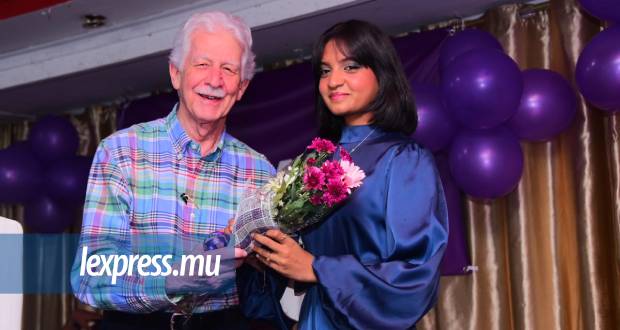Publicité
A vote for integration

A VOTE FOR INTEGRATION…?; the pressing need to define, understand and internalise the “Integration of children with learning disabilities into mainstream education”
One day at school assembly the head master was waxing lyrical about the plight of people who were disabled: how they should have the same and equal choices, opportunities and status that the rest of us take for granted. When his ‘sermon’ was over the deputy head began pounding out the first few lines of “Glory to thee, motherland oh motherland of mine …”. Thus the subject of disability appeared to be neatly dispensed with.
It was at this point that a little girl, in a wheel chair, who accompanied her mother to drop her brother, put her hand up in one swift, straight, definite movement. There was a look of determination on her face. It stopped the singing and the headmaster gestured towards her. “What is it?”
The attention focused on her.
“Why can’t I come to the same school as my brother?”
A pause followed, during which a vague puzzled look appeared on the face of everyone.
She persisted, “he comes to this school and I come to drop him; why can’t I also come here?”
“All human beings are born free and equal in dignity and rights; (Universal Declaration of Human Rights- 1948 that is enshrined under Chapter II of the Mauritian Constitution).
Integration of People with Learning Disabilities in the mainstream society is now in the forefront of many people’s minds. To many parents, educationists and other professionals, ‘Integration’ principally refers to the placing of Children with Special Educational needs, who would formerly have been educated in ‘Special Schools’ in mainstream schools, together with additional resources to ensure that they benefit from the placement.
This is an attempt to define, understand and analyse the ‘Integration of Children with Learning Disabilities into mainstream education’. The advantages and disadvantages of ‘Integration’ are examined by putting into perspective the social, political, economic, emotional, educational and health issues put forward for the integration of Children with Learning Disabilities into mainstream education. The paper then leads to the analysis of the limited existing and persisting provision of ‘Segregated Special Education’ for Children with Learning Disabilities. Thus, considering the strengths and weaknesses of special education, the views of the society and of the parents of children with learning disabilities and professionals in the educational field on non-integrated education is discussed.
“…Special educational provision may be a manipulated tool of the society to segregate people with learning disabilities…”
Further, by using research evidence, the paper analyses the bias-nature of the reasons given to support ‘Segregation’. Thus eliciting the reasons supporting segregation, the basis of the fact that ‘Integrated Education’ is a better alternative to educate Children with Learning Disabilities is laid down with the advantages it entails.Finally the paper brings into perspective how “Integration of Children with Learning Disabilities into mainstream education” contributes towards a fare and just society where each and everyone with a is brief consideration of the future on ‘Integration’ in our country, the paper proposes for ‘A vote for integration’.
Segregation, division or inequality in education has continuously been taking place. By denying the Basic Human Rights that: “All human beings are born free and equal in dignity and rights”, the Society has continuously been denying equal access to education to Children with Learning Disabilities. There was a time when these Children were labeled as ‘Idiots’ and ‘Imbeciles’ and therefore considered to be uneducable.
In England it is should be noted that prior to 1970, educational needs of Children with Learning Disabilities were the responsibilities of the Public Health Departments. Then, for the education of 35000 children involved, it was a major landmark; recalling the famous quotation from the brochure for Park House: “We have labored under the appalling conviction that idiocy is without remedy and therefore we have left it without help. It may now be pronounced not as an opinion but as a fact that the idiots may be educated”. Thus followed the 1970 Education Act in England, when the educational needs of Children with Learning Disabilities were recognized and the responsibility was transferred to the Local Education Authorities. Following this Act, ‘Special’ provision was made in 1971 by segregating children with learning disabilities into ‘Special’ schools for educationally subnormal-moderate and educationally subnormal-severe. Then In 1978, the Warnock Report was published thereby creating an increasing awareness of the fact that ‘A disability does not necessarily create a special educational need. Such needs arise if the child’s environment cannot compensate for the disability without extra help’.
“… No handicapped child should be sent to a special school who can be satisfactorily educated in an ordinary school…”
The Warnock Report formed the basis of the 1981 Education Act of England and Wales and consequently Warnock’s recommendations, ‘No handicapped child should be sent to a special school who can be satisfactorily educated in an ordinary school’, became law. The Act bears the statement under section 2 that Local Authorities ‘Have a duty to arrange suitable education for all children in their area up to the age of 19 years old’. Furthermore, The Children Act 1989 of England and Wales replaced almost all of the various items of legislation relating to Children with a single coherent framework. In law, in England and Wales, Children with disabilities are treated first and foremost as Children with particular needs and are entitled to the same general level of services as other children in need, to enable them to live as normal a life as possible. Thus the Act placed a clear, positive and separate duty on Authorities to provide services designed:
- To minimize the effect on disabled children in the area of their disabilities
- And therefore to give such children the chance to lead lives which are as normal as possible.
The above extract is utopic when contrasted with the prevailing system of education in our Country, which would arguably appear to be light years behind and it would also appear that a Child with Learning Disabilities in England and Wales is legally equally entitled access to education as any other Child. It is coming to the end of 2018; time to climb on the roof and scream our Country is developing at the speed of ‘Metro Express’ and ‘Smart Cities’ and yet not even a sign of consideration to empower each and everyone of our Child as equal when it comes to the fundament of the right to access to education. If Public opinion is portrayed through the Government in Legislation in a Democratic Nation [Plato, 437 B.C.], then it is legitimate and morally compelling to assume that the ‘Integration of Children with Learning Disabilities into mainstream education’ in legislation should show the general consensus of the Public. And yet, there is no concrete sign of one or the other; equal rights to education of each and every child born in our Country is concern only for parents of Children with Learning Disabilities or is it concern of each and every Mauritian which in turn should be the primary concern of Policy makers and Legislators?
Each and every responsible member of our Society should be puzzled as to why ‘Integration of Children with Learning Disabilities into mainstream education’ has not yet even been tabled as a compelling matter for an open positive discussion – if not instead being left as a myth; why when it comes to even its consideration let alone its implementation we, as a Nation, we remain uncomfortably silent besides some artificial self fulfilling miserable attempts to fill the existing vacuum in our education system. Why are people still opting for the segregation of children with learning disabilities into special schools, where seats remain acutely limited, rather than ‘Integrating’ all our children equally, together, in mainstream schools? Someone wise once said – ‘The greatness of a nation can be judged by the way its animals are treated. Roving dogs do not indicate the civilisation or compassion of the society. They betray on the country the ignorance and lethargy of its members [...]’. Sadly, if you want to see how ‘ignorant and lethargic’ we are as a Nation then let us open our eyes and our mind and see how we have failed to consider our Children equally under our supreme law—our Constitution.
“… Anthropological arguments suggest that sometimes in order to achieve equality, disadvantaged groups need different situations and a level of separation to develop their own strengths and identities…”
It has often been assumed that the best way of ‘Helping’ a child with learning disabilities is to place him/her in a segregated special school, where he/she would mix with other children at the same level of development and with the same sorts of difficulties. The theory underlying this outlook is that the child’s needs would be best met in that type of establishment because it would have small classes, staffed by specially trained teachers with additional services available on site. Even anthropological arguments suggest that sometimes in order to achieve equality, disadvantaged groups need different situations and a level of separation to develop their own strengths and identities. Thus, it is argued that special schools aim to give children with learning disabilities a sense of their own worth and a chance to taste success by separating them away from the mainstream society.
From direct interactions, it was found that some parents of children attending special schools have their reservations against “Integration” too. They show their fear for the high population of ordinary schools and the lack of resources, which will be required to address the needs of their children. They fear their less able children may be bullied, scapegoated and made fun of when they will not be able to answer to the various social, educational and physical demands made upon them. They, thus, prefer the “sheltered environment” of the special schools where they are convinced that there is enough teaching, stimulation, competition and fun for their children.
Integration is also viewed with anxiety and concern by parents of fully abled children, as do some professionals within education. They are concerned that children with learning disabilities may not benefit from integration and their presence alongside the fully abled children can present too many difficulties and demands on teachers and the organisations of the school, thus affecting the standard of the education delivered and therefore the fully abled child may lose out. Parents of fully abled children argue that their children may pick up non-acceptable behaviours from those with learning disabilities in the integrated environment. And the point that it may be more costly for the Authorities to provide for special needs in ordinary schools than in special schools has often been raised.
In our Country any child has got the right to attend any school in his/her area of residence. However, when it comes to children with learning disabilities, the only option available since always has been to attend special schools often far from their place of residence, away from their own siblings and community and more than often even the not so attractive option of special school is not available to each and every child in need. Sadly at the very tender age of a child with learning disabilities, our Society and our Legislations tend to socialize him/her into a culture of an ‘ALIEN’; he will grow in a Society and a Community from which he or she will be segregated; arguably all this is to the benefit of the child who has a learning disability!
Many social scientists have agreed that education is the very basis for the human animal to become a social member. Both formal and informal education constitutes the process of socialization, which introduces man to the society. Hence, arguably by manipulating the educational process of a group of people, the society may manipulate the socialization process of that group of people. The ‘Norms’ and ‘Values’ acquired by the group during its process of socialization determine its identity. If these ‘Norms’ and ‘Values’ differ from the mainstream society, the group acquires a separate identity with respect to the mainstream society. Hence, therefore, through ‘segregated special education’ a child with learning disabilities may be separated from the mainstream society and hence the argument that ‘segregated education’ in effect prepares a child for a ‘segregated life’ in adulthood. Childhood is a unique stage characterized by constant growth and development; physical, emotional and intellectual. If development is something observed and assessed overtly through behavioural patterns; then, any professional concerned with education should recall that behavior is learnt by the various stimuli present in the environment. Thus by segregating a child, society tends to manipulate the environment of the child. And by manipulating the environment, the society may therefore manipulate the development of the child.
The Fish Committee (1985) in its report recommends that children with learning disabilities should have the opportunity to interact with their contemporaries and stressed the importance of all children having equal access to an acceptable range of equal opportunities. Other researchers add that is essential to provide children with the least restrictive environment possible and opportunities for wider experience to enhance development. Brown and others in 1980 asserted it is best for children with learning disabilities “to be exposed to, to be involved with and to be treated as” fully abled students as much as possible, thus reducing the differences in approach towards children with learning disabilities and fully able children to provide equal opportunities for development to all children. And, despite all this, it is still being argued that ‘Integration’ may be at the expense of the children with learning disabilities.
“… it has often been assumed ‘integration’ means sending all children to ordinary schools without the necessary provision for the needs of children with learning disabilities”.
During interactions with professionals in the education sector, it was surprisingly found that it has often been assumed ‘integration’ means sending all children to ordinary schools without the necessary provision for the needs of children with learning disabilities. From parents and teachers in special schools, it was gathered, there is a general fear that facilities available in special schools won’t be provided in ordinary schools. It remains an uncompromising fact that ‘Integration’ cannot succeed unless the required need for extra resources is met. Existing resources of special schools should be made available to local ordinary schools. Extra investments into ordinary schools should enable them to ameliorate or extend their infrastructure to accommodate children with special needs and to provide equal access to education to all children. Ordinary schools should broaden their perspective and view educational needs in terms of health, social and environmental demands made on all children equally. The expertise of special school teachers, other professionals and parents of children with learning disabilities should be shared and made profitable to the ordinary schools. Flexibility in the school curriculum
“…Flexibility in the school curriculum should reflect the needs of our children respecting their abilities/disabilities rather than reflecting the needs of the society”.
should reflect the needs of our children respecting their abilities/disabilities rather than reflecting anything else. ‘Integration’ thus structured, coordinated and initiated by all the means which our fellow human kind has developed, can be but positive to each and every child, to the whole of our Society and to our Country.
It is common knowledge that special schools often have a wider catchment area than ordinary schools. Children who manage to secure a seat and attend these special schools often find themselves sitting in travel for several hours each day, several days each month and at several months each year. ‘Integration’ will dramatically reduce this travelling time, thus allowing children with learning disabilities extra time for education and learning. Experts have suggested that play becomes more normal in ‘Integrated’ settings and the child in the regular class can learn a great deal from sharing activities, experiences, time and location with the child with learning disabilities into mainstream education. Integrated education helps to develop a sense of responsibility towards people with disabilities and encourages other children to accept people with disabilities into their culture and not treat them as separate and ‘abnormal’. And as for teachers, integration encourages the need for all teachers to be child centered rather than curriculum, competition and or exam centered in teaching approaches.
“…Integration…the nation owes them and the society should not deny them…”
For children with learning disabilities ‘Integration’ does not just mean fulfillment of their basic human rights, that the nation owes them and the society should not deny them; ‘Integration’ for these children means:-
- They will be with and near their siblings in the local ordinary schools,
- Normal socialization will occur into a less restrictive environment,
- There will be general participation in community life,
- The development of friendship with non-handicapped children among the local peers will be promoted,
- The provision of a range of age appropriate role models from the mainstream school children,
And overcoming obstacles of prejudice and ignorance that are prevalent in the community against people with learning disabilities;
thus allowing them to grow alongside fully abled children and enabling them to fulfill the desire to belong and not to be discriminated against because of disabilities or learning difficulties, which it is strongly believed is a perfectly legitimate human aspiration of each and every citizen of this Country – with or without learning disabilities. Hence, ‘integration’ gives the opportunity of not only ‘being’ but also of ‘feeling’ an integral part of the very society in which children with learning disabilities are born.
“… to think of an individual as a holistic being”…
As a citizen of our Country, with the belief that the educational needs of children with learning disabilities should be answered, it is viewed that ‘integration of children with learning disabilities into mainstream education’ as a complementary step towards the very goal/aim of a fair and just society where the constitutional rights of each and every individual without any discrimination is duly respected. The teachings of Life should broaden our perspective to think of an individual as a holistic being; to think of every single factor- intro or extra environmental of the individual – as having a considerable effect on the overall well being of the individual. Adopting this stand, it is thoughtfully suggested that a responsible Citizen should be able to view any other Citizen as an equal in a Social, economic, political, cultural, psychological and physiological context (by internalizing the very teachings of human beings such as Mandela).
Through ‘Integrated education’ children with learning disabilities grow while facing the reality that they are unable up to various degrees to perform various tasks in the same society with respect to their contemporaries. The drawback may be that these children will experience frustration, but the advantage is that they will become more aware of their abilities in the ‘normal’ non- segregated society. Adjustments are made in their lifestyles very early during their lives so that they grow with them psychologically and physically with a realistic vision of the future and a reasonable degree of confidence to succeed in their lives in the bosom of their society. Integrated education allows a person with learning disabilities to have an integrated-social identity from the very beginning of the process of socialisation. By avoiding confusion due to the role differentiations from a ‘Segregated – lifestyle’ in adulthood, integrated education allows consistency on a social dimension for a person with learning disabilities throughout life. Integration, therefore, provides a defined role “in an open setting with the real hurly burly of life”; hence promoting social role valorisations to take place on its normal course and provide a normal setting for a ‘Normal’ lifestyle in the community for all persons with or without learning disabilities: which should be the main focus of a responsible civilized society which in turn should be echoed by a responsible Government and overt in the Policy decisions of the latter.
Integration of children with learning disabilities into mainstream education does not only promote physical growth and development but also enhance self-awareness, self- actualization, internalization and development of interpersonal skills. Thus ‘integrated education’ further develops the ability to be more independent, self-reliant and hence more able to lead a ‘normal lifestyle within one’s community; which eventually WE as a NATION we have a duty to achieve.
Finally, it proper also to emphasize that children with special educational needs above all needs understanding, support and tolerance as all other children; which they deserve as human beings and we owe them as fellow human beings. Unless and until WE as a responsible Nation change our mindset and ‘dig our heads out of the sand’, every effort to ask for “a vote for integration” will undoubtedly raise a question mark even in the minds of those who strongly believe in an integrated society. Because “until from the very beginning it is recognized that children with learning disabilities deserve equal access to mainstream educational facilities, people with learning disabilities will continue to be marginalized and efforts to achieve their integration into society will remain limited”. Thus begins the quest for “A vote for integration”
Publicité
Les plus récents






